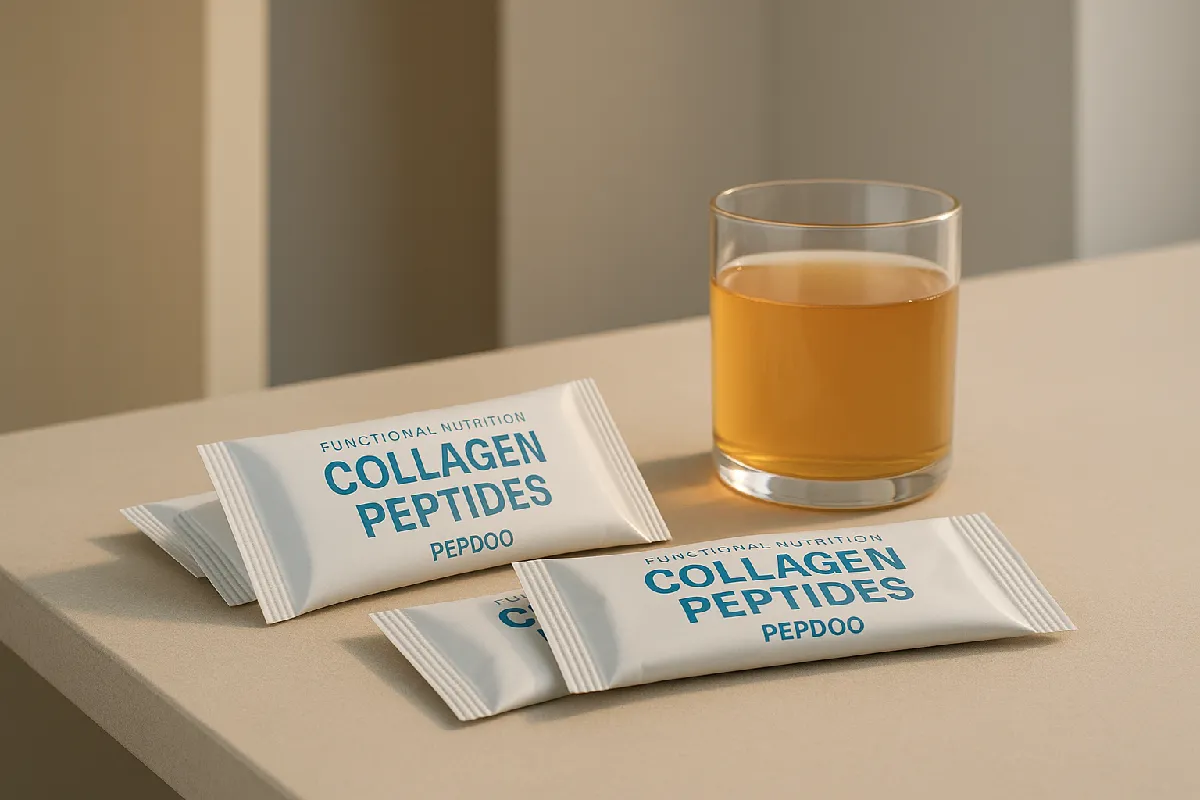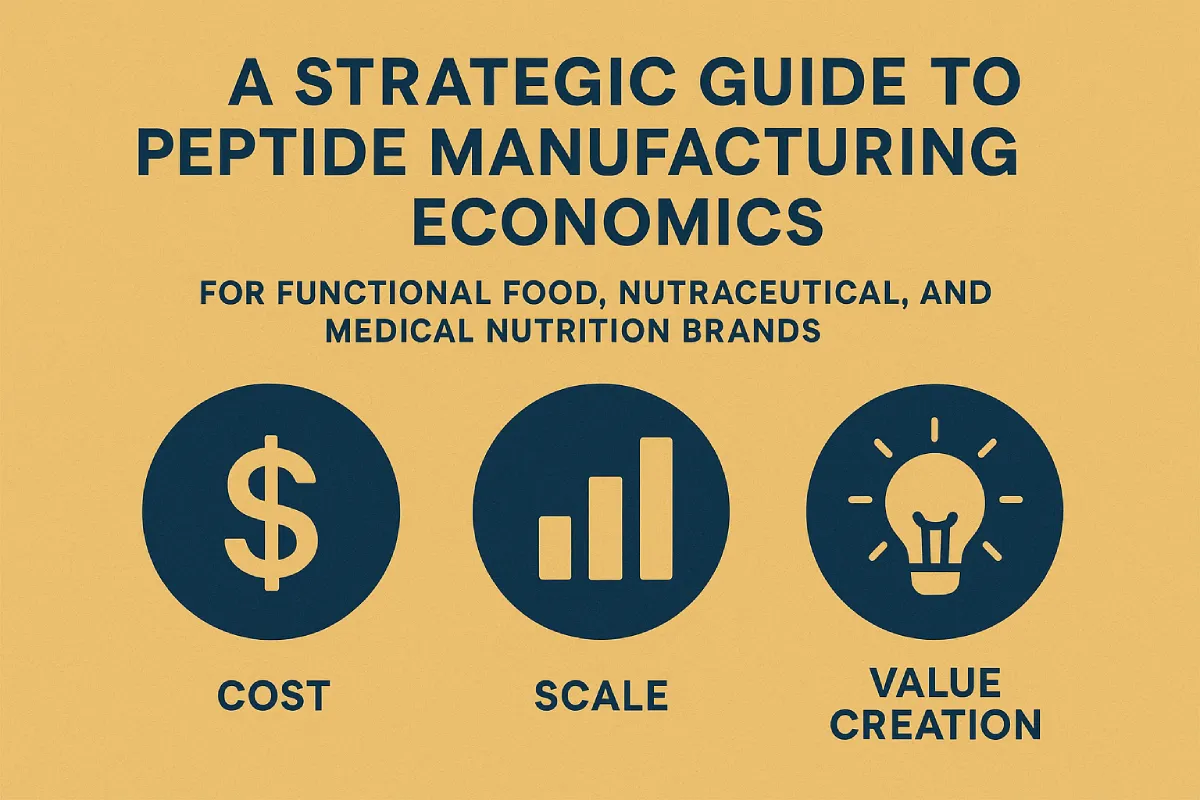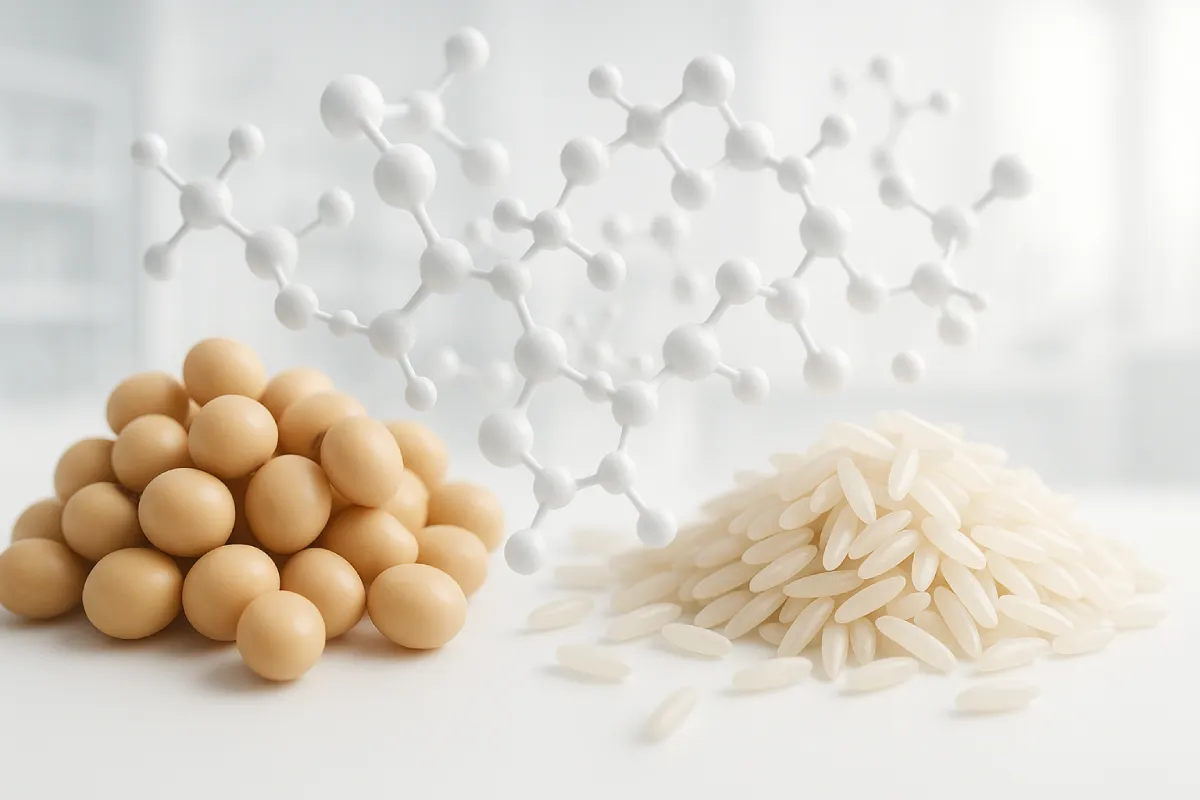Why oat bioactives matter now
Oats occupy a unique position in the plant-based ingredient landscape: they supply both a clinically validated soluble fiber (β-glucan) and a growing portfolio of bioactive peptides derived from oat protein hydrolysates. Combined, these two ingredient classes address two of the most urgent product briefs for today’s functional-nutrition brands — gut modulation and cardiometabolic risk management — by acting across the emerging gut-heart axis. For procurement, R&D and product teams seeking clean-label, plant-first solutions, an Oat Peptide + Beta-Glucan Complex offers a differentiated technical and marketing story that is also supported by mechanistic and clinical evidence.
Oat peptides: small molecules, multiple mechanisms
What they are. Oat peptides are low-molecular-weight sequences generated by targeted enzymatic hydrolysis of oat protein. Properly produced oat peptides (e.g., <1 kDa fractions) combine rapid intestinal absorption with sequence-specific bioactivities.
Key functional effects relevant to formulators: antioxidant and anti-inflammatory activity, ACE-inhibitory and blood-pressure modulation potential, and effects on lipid metabolism and intestinal barrier function. Such mechanisms make oat peptides particularly attractive as a plant-based functional protein fraction that can be formulated into powders, RTD beverages, medical nutrition and specialty supplement formats. Recent reviews and experimental work summarize oat protein and peptide bioactivities across antioxidant, antihypertensive and lipid-modulating endpoints.
Formulation advantages: oat peptides typically have neutral flavor profiles (or can be taste-masked), good solubility, and thermal/pH resilience when manufactured to spec — properties that simplify incorporation into both heat-processed and cold-fill products. For B2B partners, choosing a reliable oat peptide manufacturer with scaleable, patented hydrolysis and fractionation lines reduces analytical variability and speeds regulatory dossiers.
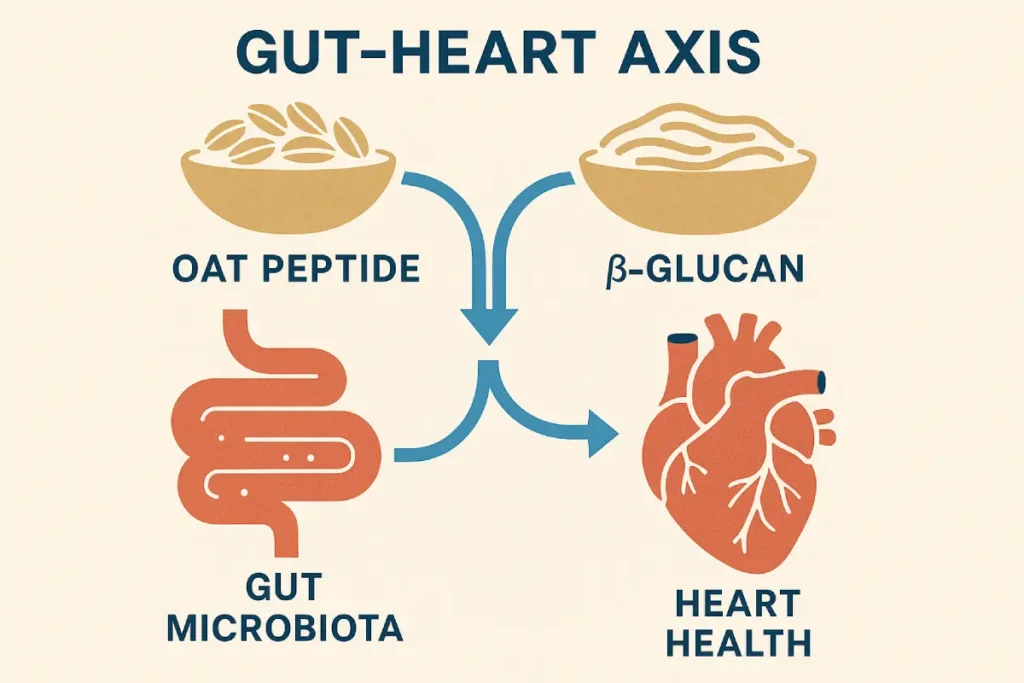
Beta-glucan: the proven fiber anchor for heart health
β-Glucan from oats has a well-established evidence base for reducing LDL-cholesterol and supporting cardiometabolic endpoints when consumed at efficacious doses. Regulatory bodies and scientific panels have summarized the body of evidence showing that oat β-glucan contributes to lowering serum LDL-cholesterol — a claim framework that remains highly useful for product positioning when combined with complementary actives.
Mechanisms relevant to the gut-heart axis: the soluble fiber binds bile acids and reduces cholesterol reabsorption, while gut fermentation of β-glucan produces short-chain fatty acids (SCFAs) that modulate host metabolism and systemic inflammation. From a formulation perspective, oat β-glucan also contributes viscosity and mouthfeel — attributes that can be leveraged in bars, shakes and creamy RTD formats.
Synergy along the gut-heart axis: how peptides + β-glucan interact
The gut-heart axis concept frames a cascade: dietary components alter microbial composition and metabolites (e.g., SCFAs), which in turn modulate systemic inflammation, endothelial function and lipid metabolism — all core determinants of cardiovascular risk. When oat peptides and β-glucan are co-delivered as a tailored complex, their mechanisms converge:
- Gut level: β-glucan serves as a fermentable substrate that supports beneficial microbes; oat peptides can modulate local inflammation and reinforce barrier integrity, creating a more resilient mucosal environment.
- Systemic level: fermentation-derived SCFAs and peptide-mediated signaling reduce pro-inflammatory cytokines, support lipid clearance and can improve insulin sensitivity — pathways relevant for cardiometabolic product claims and clinical endpoints.
For formulators, the practical implication is that a balanced oat peptide : β-glucan ratio can deliver both immediate molecular effects (peptide signaling) and sustained microbiome-mediated benefits (β-glucan fermentation), producing a multi-axis functional claim set that resonates with clinicians and sophisticated consumers.
Practical formulation guidance for B2B teams
Below are product-level recommendations derived from industrial experience and translational science — intended as R&D starting points, not final recipes.
Target formats & role of the complex
- Cardio-metabolic nutrition powders (weight control, cholesterol support): soluble complex providing 1.0–3.0 g oat β-glucan per serving plus 1–3 g standardized oat peptide fraction. Use micronized β-glucan for mouthfeel control.
- Gut-focused beverages & shots: lower viscosity extracts with 0.5–1.5 g β-glucan, 0.5–2 g peptide per dose; pair with proven probiotic strains for synbiotic claims.
- Clinical / medical nutrition: sterile-compatible peptide fractions (low endotoxin, controlled molecular profile) for enteral formulas where improved nitrogen efficiency and low allergenicity matter.
Stability & compatibility notes
- Test peptide integrity after pasteurization; select peptide fractions with validated heat tolerance for RTD formats.
- pH range 3.5–7.0 is generally safe for activity retention, but run accelerated stability on SCFA proxies and peptide HPLC fingerprints.
- Flavor: oat peptides are typically neutral; use masking flavors for citrus or cocoa matrices as needed.
Regulatory & dosing guidance
For cholesterol-related messaging in many jurisdictions, provide clinical or meta-analytic support for β-glucan dose (EFSA evidence commonly references ~3 g/day for measurable LDL reductions) and ensure labeling aligns with local regulation.
Real-world success stories (commercially relevant case studies)
B2B decision-makers value tangible outcomes. Below are three anonymized but operationally detailed case studies demonstrating manufacturability, market performance and clinical utility.
Case 1 — Southeast Asia functional beverage brand
Brief: launch a daily heart-health RTD targeting middle-aged consumers.
Approach: integrated Oat Peptide + Beta-Glucan Complex (2.5 g β-glucan + 1.5 g oat peptide per 250 mL) + natural citrus flavor.
Outcome: pharmacy and health-store rollouts reached 18% category share in select channels within 3 months; technical audits reported excellent matrix stability and consumer repeat rates above 55%. (PEPDOO® assisted with pilot-scale formulation and shelf-life validation.)
Case 2 — China medical nutrition supplier (enteral component)
Brief: reduce inflammatory burden and improve nitrogen utilization in a postoperative nutrition formula.
Approach: low-allergen oat peptide fraction incorporated at therapeutic protein levels; β-glucan added for mucosal support.
Outcome: clinical monitoring showed a ~15% improvement in nitrogen retention and fewer GI intolerance events versus control formula; the product achieved hospital tender acceptance after stability and safety dossiers were submitted. (PEPDOO® provided GMP batches and analytical documentation.)
Case 3 — European plant-based meal replacement brand
Brief: differentiate on clinically backed heart and gut claims.
Approach: “clinical-backed plant complex” marketed using oat peptide + β-glucan, supported by in-house post-market consumer biomarker panel.
Outcome: elevated earned media and technical buyer interest; two major distributors requested co-branded dossiers for store listings. (PEPDOO® supplied customized technical and marketing assets.)
These cases illustrate the blend of R&D, analytical rigor and production reliability required for B2B success — capabilities that experienced peptide manufacturers must provide.
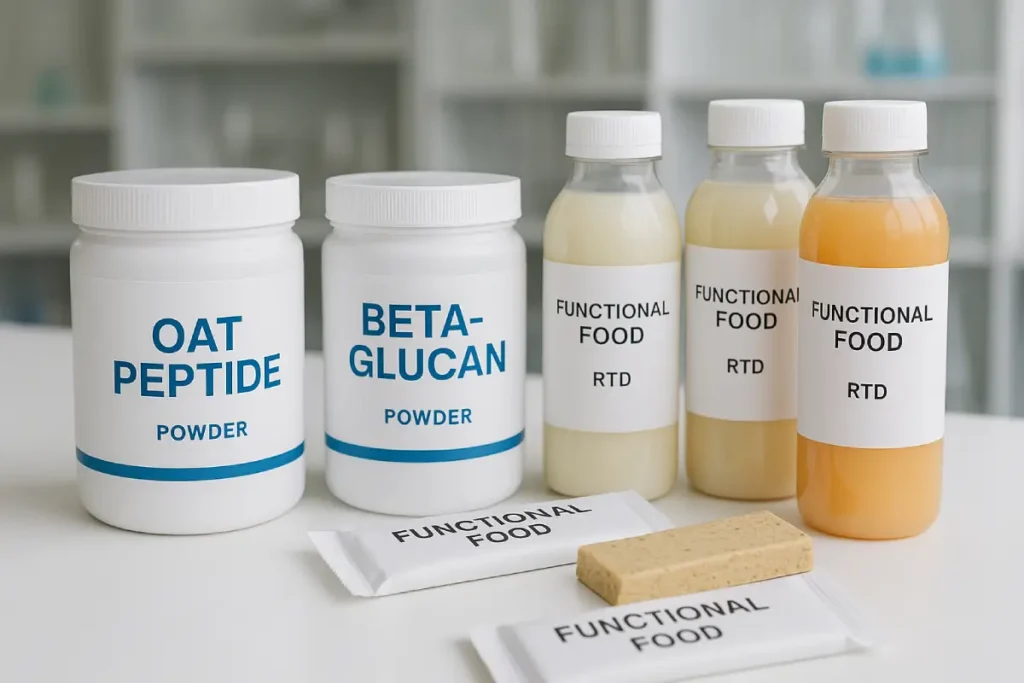
Why partner with a full-cycle peptide manufacturer (PEPDOO®)
For brands that want to move beyond commodity ingredients, supplier selection is strategic. PEPDOO® positions itself as a full-category peptide manufacturer with the following value drivers for B2B partners:
- Patented, multi-enzyme hydrolysis and fractionation technologies that produce standardized, low-molecular-weight oat peptide fractions with reproducible bioactivity.
- Proven IP and standard-setting role in China’s peptide sector — multiple patents and participation in national standard development — which accelerates dossier preparation and quality alignment.
- End-to-end capability: from peptide design → bench validation → pilot scale → GMP production → OEM/ODM packaging and technical marketing support.
- International credentials: FSSC/ISO/GMP operations, and experience supplying regulated markets with required analytical and safety documentation.
These capabilities help reduce time-to-market, lower regulatory risk, and enable co-development paths that are increasingly valuable for high-trust channels such as medical nutrition, nutraceutical distributors and private-label brands.
Future directions: multi-component oat complexes & clinical translation
The next wave of product innovation will combine peptide fractions with tailored prebiotics, probiotics and discrete polyphenol fractions to create validated multi-pathway formulas. Early translational work suggests oat peptide fractions can complement β-glucan’s microbiome modulation, producing robust biomarker changes (lipid, inflammatory and metabolic) when integrated into sustained dosing regim
Next Steps for B2B Teams: Oat Peptide + Beta-Glucan Gut-Heart Axis Application
An Oat Peptide + Beta-Glucan Complex is a technically viable, market-relevant and clinically promising platform for brands aiming to address cardiometabolic health and gut resilience. For B2B teams we recommend:
- Technical audit: request peptide MW distribution, amino-acid profile, HPLC fingerprints and β-glucan molecular weight distribution from suppliers.
- Pilot formulation: run 3 prototypes (powder, RTD, clinical formula) with accelerated stability and sensory evaluation.
- Regulatory mapping: confirm allowable claims and dose thresholds in target markets; secure analytical and safety documentation.
- Co-development: engage a peptide manufacturer with pilot-to-scale GMP capability and clinical collaboration experience (e.g., PEPDOO®) to shorten development timelines and strengthen technical dossiers.
If your team would like, PEPDOO® can provide a tailored technical brief, stability protocols and a pilot-run sample pack to accelerate first-in-category launches.
Accelerate Your Functional Nutrition Innovation
Discover how PEPDOO®’s Oat Peptide + Beta-Glucan Complex can power next-generation gut-heart axis products. Request a tailored technical brief, pilot samples, and co-development support today.
Request Technical PackFAQ
The complex combines enzymatically hydrolyzed oat peptides (low molecular weight, bioactive) with soluble oat β-glucan fiber. Together, they act on the gut-heart axis, supporting gut microbiota balance, cholesterol management, and cardiometabolic health. For B2B partners, this is a ready-to-formulate ingredient platform for functional foods, beverages, and clinical nutrition.
- Differentiated product claims: gut-heart axis, cholesterol reduction, anti-inflammatory support.
- Multi-format use: powders, RTDs, bars, clinical nutrition formulas.
- B2B advantage: allows brands to incorporate a clinically supported, plant-based peptide + fiber solution with patent-backed bioactivity.
- Peptide molecular weight: <1 kDa fractions ensure rapid absorption and bioactivity.
- Stability: peptides are generally heat- and pH-stable; β-glucan viscosity must be balanced in liquid formulations.
- Compatibility: neutral flavor profile allows integration into sweet, savory, or cocoa-based matrices.
- Pilot testing: recommend accelerated stability and HPLC profiling before scale-up.
- Cardiometabolic powders: 1–3 g oat peptide + 1–3 g β-glucan per serving.
- Gut-focused beverages: 0.5–2 g peptide + 0.5–1.5 g β-glucan per dose.
- Clinical nutrition / enteral formulas: peptide fractions at therapeutic protein levels; β-glucan added for mucosal support.
Note: Always verify local regulatory guidelines for health claims and labeling.
Yes, PEPDOO® has supported multiple B2B partners:
- Southeast Asian RTD brand: increased category share with 2.5 g β-glucan + 1.5 g peptide per 250 mL serving.
- Chinese medical nutrition supplier: ~15% improvement in nitrogen retention and reduced GI intolerance in postoperative formulas.
- European meal replacement brand: enhanced consumer engagement and distributor interest using clinically backed oat peptide + β-glucan formulations.
- Full-category peptide manufacturer: scaleable, GMP-compliant production of standardized, low-MW peptide fractions.
- Patent & standard leadership: China-leading patents and participation in national peptide standard-setting.
- End-to-end support: from pilot formulation → GMP manufacturing → OEM/ODM services → technical & marketing support.
- Global credentials: ISO/FSSC/GMP certified, experience supplying regulated markets.
Yes. The oat peptide + β-glucan complex is compatible with synbiotics, polyphenols, or other prebiotics, enhancing gut microbiome modulation and systemic benefits. Co-formulation may further strengthen claims for cardiometabolic and digestive health.
- Functional powders: shakes, meal replacements, cardiometabolic support.
- RTDs & shots: gut-health beverages or daily wellness drinks.
- Medical/clinical nutrition: sterile peptide fractions suitable for enteral nutrition formulas.
- Bars & snacks: β-glucan contributes texture while peptides provide bioactive protein.
References
[1] Rafique, H., et al. (2022). *Dietary-Nutraceutical Properties of Oat Protein and Peptides.* *Foods*, **11**, Article. [2] European Food Safety Authority (EFSA) NDA Panel. (2011). *Scientific opinion on the substantiation of health claims related to beta-glucans from oats and barley and maintenance of normal blood LDL-cholesterol concentrations.* *EFSA Journal*, **9**(6):2207. [3] Jaeger, J. W., et al. (2024). *Microbiota modulation by dietary oat β-glucan prevents cardiometabolic dysregulation.* *Nutrients / Frontiers / PMC* (2024). https://www.ncbi.nlm.nih.gov/pmc/articles/PMC10844974/. [4] Ji, Z.-H., et al. (2023). *Oat peptides alleviate intestinal inflammation via Keap1-Nrf2 signaling.* *Food & Function / PMC*, (2023). https://www.ncbi.nlm.nih.gov/pmc/articles/PMC10746067/. [5] Wolever, T. M. S., et al. (2021). *An oat β-glucan beverage reduces LDL cholesterol and calculated CVD risk.* *Journal of Nutrition / Clinical Research* (2021).


